Humans of Aura
Bill and Kim Horne: We enlisted for service but found adventure and love
Kim and Bill Horne met while serving in the army. They currently live at Kingsford Terrace Corinda taking advantage of Aura Holding’s transfer program while awaiting construction of their ‘forever home’ beside the beach at The Pavilion North Kirra. Here is their shared story.
Bill
I was raised in Toowoomba and in 1971 joined the army aged 16. Back then you had to sign up for nine years but I saw the army as the best opportunity to do an electronics trade. So I left Toowoomba and spent the first few years in Melbourne. It was challenging and I was very homesick.
A day in the life of a trainee was interesting and varied. We were there for trade training and military training, so that meant you could be in the classroom learning about electronics, then out on the rifle range practising shooting, going bush to do exercises or be back in the barracks for structured PT lessons. There was a lot of variety and I guess that made it enjoyable because it wasn’t the same thing every day.
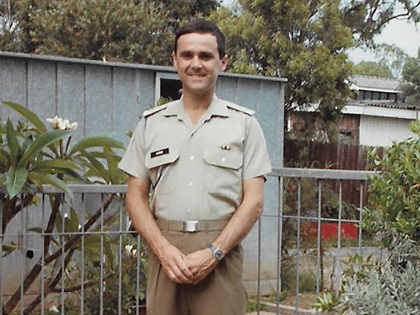
I lived for three years at Balcombe Barracks on the Mornington Peninsula in timber buildings that had originally been built as temporary accommodation in World War II for the Americans before they went to the Pacific theatre. The top of the walls had chicken wire so the wind would come straight through and, of course, there was no insulation. Ten of us were in each of these open huts and all our earthly possessions had to be fitted inside our small metal lockers. In a Melbourne winter we would often come back from our training and if you weren’t the first into the showers you had a cold one as the hot water ran out after the first person.
My group started off with about 46 recruits and we graduated with 23 - generally in most army training only around half finish. We were only 15 or 16-year-old kids who got homesick and for some it all got too much, so off they went back home. But I stuck it out and I’m glad I did even though it was hard at the start but you did adjust and got used to the life.
Back in the early 1970s only 60 per cent of Australians had a home phone and, of course, there was no such thing as a mobile phone. My Mum and Dad certainly didn’t have a phone as they couldn’t afford one, so the method of communication was writing letters. Also, back then I earned $10 a week and an interstate call cost $1 a minute! I’d write a letter and Mum and Dad would get it about a week later. Mum was very good and she would write back straight away so I was writing letters every few weeks. That was my contact with my family.
With my electronics training I went into Signals corps (communications) where in the main I was fixing transmitters, receivers and various electronic equipment that the military used. Things really slowed down post-Vietnam for promotions so I headed off for Officers’ training. It was a very intense 12 months at the then Portsea Officer Cadet School but after that, I returned to communications and performed various roles for the rest of my army career.
After 20 years I finished at the rank of Major and went to work for corporate companies, initially as a project manager and later as a business manager in IT organisations. I found that my army training really suited that environment. I really enjoyed the challenges but, of course, you had to be very committed and do long hours, so in 2012 I felt it was time to try something a little less demanding. So I resigned and we did a big trip to Europe, then moved to the Gold Coast where almost immediately I got a job at Griffith University as a business manager, staying there for eight years. We’re retired now but busy and volunteer with our church. Rather than being retired, Kim and I talk about having “pivoted’’ from paid work to unpaid work.
Kim
I grew up in Sydney in a blue-collar family and I was lucky enough to be the first in my family to obtain a Higher School Certificate. After school, I sought work as my family couldn’t afford for me to go to university and I was fortunate enough to obtain a position at Sydney University in the Department of Agricultural Chemistry, so I was earning money while participating in the university social life.
Wanting to pursue a profession, I applied for the defence forces, on a whim essentially, as a trainee officer. Training for women was separate then to the men and not combined as it is now. I trained at Georges Heights in Sydney, located above Taronga Zoo, and I vividly remember standing on the parade ground watching the QE2 sail up the harbour and thinking ‘this is a pretty nice place to be’. But the training was tough as, in theory, we were training for war.
Army logistics was my core job and I had a speciality in foodstuffs and fuels though as an Officer there was also plenty of administration to do. Each day in the army is different and with postings every couple of years, we changed jobs as well as locations. One of my postings was to be in charge of army welfare for NSW.
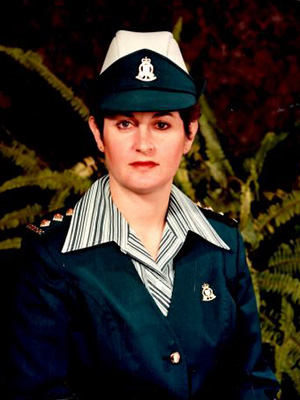
One of the scariest things I ever had to do was throw a live hand grenade; my palms were sweating and I was literally shaking in my boots. I don’t know too many women among my peers who can claim to have thrown grenades! Bill and I have both fired a range of weapons but the weapon at that time was a 7.62mm SLR (self-loading rifle). Each year we had to qualify on the rifle range and when I went out on the range I’d position the butt of the rifle into my shoulder to fire the weapon. However women don’t have much muscle padding in that area, unlike men, so afterwards I would have a huge bruise all over my upper right-hand chest from the recoil of the rifle.
I have some special (unique!) army memories such as going out bush, digging latrines, folding down my boots at night so snakes didn’t crawl in and marching, on one occasion, until my feet bled. This was all part of the training and it certainly made me as a person. I do look back very fondly and proudly on my army service.
I may have joined the army partly on a whim but my motivation was to also see the world, however, I didn’t post anywhere outside Australia! But the wonderful thing that resulted from my army service, and for which I will always be thankful, was meeting Bill. We have now been married 36 years (we were late starters) but regard ourselves as being very blessed. We believe that our meeting was meant to be. We are both Christians and try to bring that to every aspect of our lives.
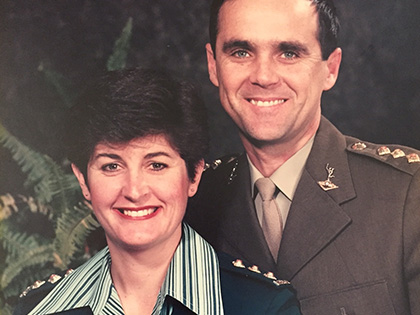
After 10 years in the army, I left to have a family. Post-army I felt I still wanted to improve myself so while we were in Canberra on Bill’s last army posting, I decided part-time study was a good option. I’d always enjoyed sport and with an admin background undertook a Sports Administration degree. It took me six years and I’ll admit it was tough studying with a young family and building a house, with Bill often away on exercise or working long hours.
Following completion of my degree, I secured a position at the Australian Institute of Sport in the Nutrition Department. The AIS is something Australians should be proud of, and it was a very exciting place to be employed especially during world championships, and Olympic and Commonwealth Games.
Then in 2012 after we found ourselves as empty nesters we decided to move to Queensland so Bill could be near his family. We moved a couple of times and downsized to a unit on the Gold Coast and then discovered ‘The Pav’ (The Pavilion North Kirra) as we call it which will be our forever home.
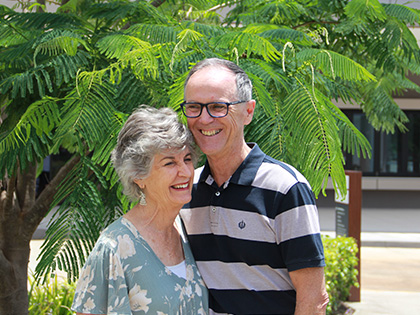
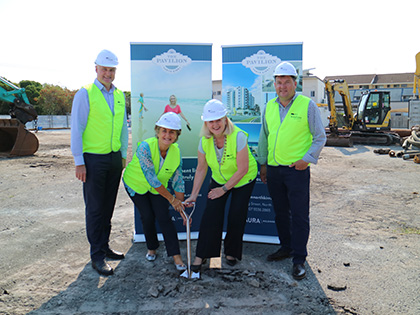
Left: Kim and Bill at Kingsford Terrace Corinda - Right: Tim Russell (Aura Holdings' Director), Kim Horne, Hon Karen Andrews MP and Mark Taylor (Aura Holdings' Director) at the soil turning ceremony of The Pavilion North Kirra
After our move to Queensland, I felt I still had something to offer professionally, and was very fortunate to obtain a position in the fundraising area at Griffith University, yes the same place as Bill. I did this quite independently but it was serendipitous working together once again, in the same organisation.
We have two sons, married to lovely wives, and both our sons are fine young men of whom we are very proud. Our eldest son is a theatre event manager and the other is in the military as an ammunition technician. We didn’t influence his decision to join the military but he was always going to have an outdoorsy profession, with the eldest son always going to be involved in the arts. Our first grandchild is due in March.
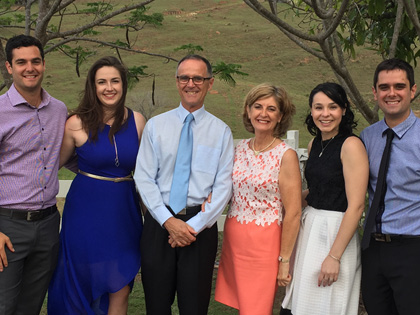
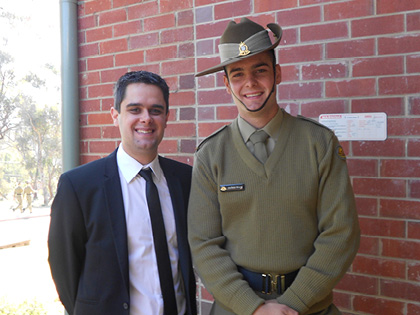
I actually have quite a strong family history in the military but that didn’t occur to me until after my own service. My grandfather served on the Western Front and two uncles – one served in New Guinea and the other was a Rat of Tobruk – had distinguished military careers. I also have a cousin who was in the army. Bill’s great-uncle also served in World War I and we were privileged to visit his grave in the Grevillers War Cemetery in France in 2012.
Bill and I didn’t march on Anzac Day until recently because we don’t identify as veterans, having not served in an active theatre. However, a couple of years ago I had replica medals made for my grandfather and Bill’s great-uncle and on that basis we felt we could march to honour their service. (The RSL also now encourages ex-service-people to march so we feel quite comfortable participating.) We look forward to marching one year on Anzac Day with our son; that would be a very proud moment.
At Aura Holdings we feel very privileged to have so many wonderful residents living in our villages. A very big thank you to Bill and Kim Horne, residents of our Kingsford Terrace Retirement Community at Corinda in Brisbane, for sharing this story with us.


